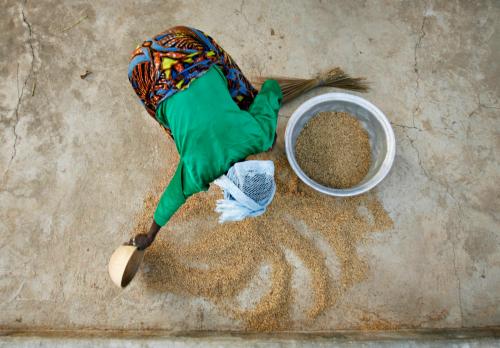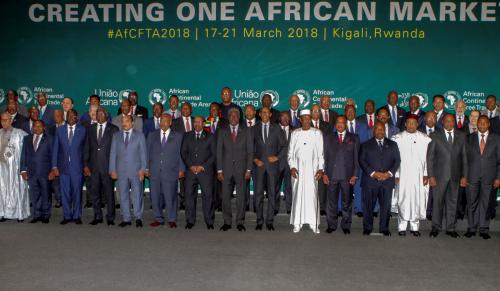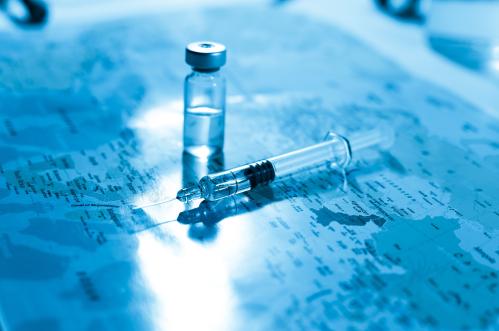Trade begins under the African Continental Free Trade Agreement
After a six-month delay due to the COVID-19 pandemic, trade kicked off under the African Continental Free Trade Agreement (AfCFTA) on January 1, 2021. All African countries but Eritrea have signed the agreement, and 34 have ratified it as of early December 2020. Under the agreement, African signatories will progressively eliminate tariffs in order to encourage intra-regional trading, which is low compared to other regions of the world. The World Bank estimates that the AfCFTA has the potential to boost Africa’s exports by $560 billion and increase wages for both skilled and unskilled workers, men and women.
The agreement has created the largest free trade area since the establishment of the World Trade Organization in 1994 and will generate a market of over 1.2 billion consumers. AGI Senior Fellow Landry Signé estimates that, under a successfully implemented AfCFTA, Africa will have combined consumer and business spending of $6.7 trillion in 2030.
Framers of the AfCFTA hope that the agreement will ease the movement of goods, people, and capital with the broader goal of reducing poverty. They also hope the agreement will make the region more self-sufficient, as AfCFTA Secretary-General Wamkele Mene explains, “We want to move Africa away from this colonial economic model of perpetually being an exporter of primary commodities for processing elsewhere.” Notably, while the agreement will eventually eliminate tariffs on 90 percent of traded goods, experts warn that that move will not be enough. Persistent nontariff barriers like poor infrastructure will continue to hinder intra-African trading in the long term, as Mene stated in February: “If you don’t have the roads, if you don’t have the right equipment for customs authorities at the border to facilitate the fast and efficient transit of goods … if you don’t have the infrastructure, both hard and soft, it reduces the meaningfulness of this agreement.”
Despite the potential for an increase in economic growth under the new trade regime, Fitch Ratings noted that AfCFTA on its own will not create enough growth to change ratings for regional sovereigns in the short term. Despite that statement, Fitch also noted, “Nonetheless, there is the potential in the longer term for AfCTFA to have a positive effect on economic policies and to support growth and creditworthiness indirectly.”
For more on the potential of the AfCFTA and the issues to still be hashed out, see Signé and co-author Colette van der Ven’s paper, “Keys to success for the AfCFTA negotiations.” For more on the short-term obstacles facing the agreement’s implementation, see Hippolyte Fofack’s recent paper, “Making the AfCFTA work for ‘The Africa We Want’” and related blog on the issue.
COVID-19 update: Africa succeeds in acquiring vaccine doses
After being relatively spared by COVID-19 during the months of September, October, and November, Africa has seen a second wave of cases. According to data from the Africa Centres for Disease Control and Prevention (Africa CDC) and the World Health Organization (WHO), daily cases across the continent are more than double what they were just a few months ago. Morocco, Nigeria, Egypt, the Democratic Republic of the Congo, Uganda, Kenya, and Ethiopia have all seen recent spikes in cases, leading Dr. John Nkengasong, head of the Africa CDC, to say, “Clearly, the second wave is here.” Health experts and vaccine developers have expressed particular concern over the rising cases in South Africa, which they suspect are being driven by a new, more infectious variant of the coronavirus. Notably, a study released this week found that Pfizer’s vaccine offers protection against the new, more infectious coronavirus strains first found in South Africa and the U.K.
COVID-19 vaccine deliveries under COVAX could start this month, according to the WHO. COVAX is part of an initiative led by the World Health Organization, the Coalition for Epidemic Preparedness Innovations, and the Global Alliance for Vaccines and Immunizations to ensure that low- and middle-income countries have equitable access to the vaccines as they are produced. Many African countries also aim to acquire vaccines through other means in addition to COVAX. For example, Kenya has already procured 24 million doses of AstraZeneca’s COVID-19 vaccine and expects them to arrive the second week in February, according to the health minister. Morocco has announced plans to vaccine 80 percent of its population through a mixture of vaccines from China’s Sinopharm and the U.K.’s AstraZeneca, the latter of which the country approved for use this week. The North African nation has acquired more than 60 million doses of each vaccine. This week, Senegal Health Minister Abdoulaye Diouf Sarr told reporters that, after declaring a state of emergency due to rising COVID-19 cases, the country was trying to acquire additional vaccines to complement those that it will receive through COVAX.
Niger and Central African Republic elections update
No one received a majority in Niger’s December 27 presidential election, setting up a runoff on February 21 between the two highest vote-getters, Niger’s ruling party candidate Mohamed Bazoum and former President Mahamane Ousmane. At 39 percent, Bazoum received more votes than any candidate, while Ousmane came in second at 17 percent. In the midst of jihadist violence on its borders with Mali and Nigeria, Niger is poised to confirm the first peaceful transition of power between elected presidents since gaining independence from France 60 years ago. The winner of February’s poll will have his work cut out for him redressing the economy and addressing the jihadist violence that has displaced hundreds of thousands of people.
Incumbent President Faustin-Archange Touadéra was reelected in the Central African Republic’s election also held on December 27, 2020. Touadéra secured 53 percent of the votes, greater than the majority needed to avoid a second-round runoff. The election proceeded despite violence n response to a court rejection of former President François Bozizé’s candidacy last month, due to existing U.N. sanctions for his purported support of groups that had committed war crimes between 2013 and 2015. The Central African Republic has also launched an investigation into the role Bozizé, who was deposed in 2013, played in plotting a coup in the lead-up to the most recent election. Over the weekend, the violence culminated in rebel groups capturing Bangassou, the largest city in the southern prefecture of Mbomou and located roughly 466 miles west of the capital of Bangui.
For more on Touadéra’s vision for the Central African Republic, consider watching the AGI-hosted conversation with the president in 2016, moderated by then-director Amadou Sy.






Commentary
Africa in the news: AfCFTA launches, Africa secures COVID-19 vaccines, and Niger and the Central African Republic vote
January 9, 2021